The Overnighters Blu-ray Movie
HomeThe Overnighters Blu-ray Movie 
Blu-ray + Digital CopyDrafthouse Films | 2014 | 102 min | Not rated | Feb 03, 2015
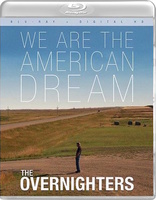
Movie rating
7.3 | / 10 |
Blu-ray rating
| Users | 0.0 | |
| Reviewer | 4.0 | |
| Overall | 4.0 |
Overview
The Overnighters (2014)
Broken, desperate men chase their dreams and run from their demons in the North Dakota oil fields. A local Pastor risks everything to help them.
Starring: Keegan Edwards, Jay ReinkeDirector: Jesse Moss (I)
| Documentary | Uncertain |
| Drama | Uncertain |
Specifications
Video
Video codec: MPEG-4 AVC
Video resolution: 1080p
Aspect ratio: 1.78:1
Original aspect ratio: 1.85:1
Audio
English: DTS-HD Master Audio 5.1 (48kHz, 16-bit)
Subtitles
English SDH
Discs
50GB Blu-ray Disc
Single disc (1 BD)
Digital copy (as download)
Playback
Region A (B, C untested)
Review
Rating summary
| Movie | 4.5 | |
| Video | 4.5 | |
| Audio | 4.0 | |
| Extras | 3.0 | |
| Overall | 4.0 |
The Overnighters Blu-ray Movie Review
Do Unto Others
Reviewed by Michael Reuben January 31, 2015The Overnighters tells a story so likely to provoke strong reactions that it feels like a script someone dreamed up to create controversy. But the story happens to be true, and it was certainly controversial in the small North Dakota town where it unfolded amidst sweeping changes comparable to an old-fashioned gold rush, except that this transformation was wrought by oil. As development of the state's shale deposits caused an explosion of jobs and opportunity, the sleepy prairie community of Williston became a boom town. As much as residents were glad for the prosperity, many felt they'd lost their home to invaders, of whom the most visible were often the job seekers pouring in daily by the hundreds, often with little to sustain them. Jesse Moss, a documentary filmmaker whose previous works include Con Man and Full Battle Rattle, was fascinated by the idea that a "boom town" could exist in modern times, having only read about them in history books. After seeing a column in the Williston Herald by a local clergyman urging the townspeople to open their arms to the influx of new people flowing into town, Moss went to Williston with his camera to meet the author of the column, Pastor Jay Reinke of the Concordia Lutheran Church. Moss ended up staying for eighteen months, blending into the population of job seekers, many of them broke, desperate and seeking a second chance in the drilling fields in and around Williston. What Moss discovered and recorded was an explosive nexus of some of the knottiest issues facing America today, the kind guaranteed to polarize conversation and set people in opposition, including poverty, joblessness, safety nets, Christianity and the right of a community to secure its borders. As if all of that weren't enough, Moss's film developed what, in Hollywood terms, might be called a "third act twist" that adds new layers of complexity to an already challenging tale. But because this is real life instead of fiction, this turn of events can't really be called a "twist". What The Overnighters confirms is that you never know how things will turn out, because people are full of surprises.
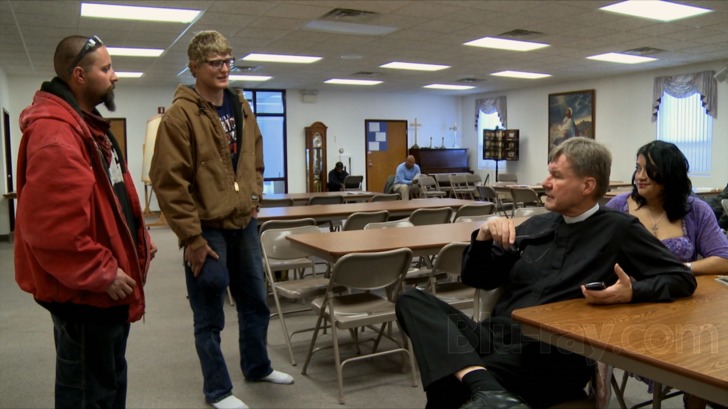
Williston is located in the southern region of North Dakota on the edge of what is known as the Bakken formation, a productive and lucrative region for extracting oil by hydraulic "fracking". As fracking operations expanded, demand for labor quickly caused rents in the sparsely populated area to soar beyond the means of many newly arrived applicants, especially those who left their homes seeking a fresh start. Pastor Reinke, believing it to be his Christian duty to help those in need, began to allow some of these temporarily homeless individuals to sleep in their vehicles in the church parking lot. He let others who did not own vehicles bunk in the church while they were looking for work. As word spread that Concordia Lutheran was a shelter of last resort, Reinke found himself providing temporary home to as many as a hundred men, and sometimes their families as well. This revolving-door group came to be known as "the overnighters". Moss's camera follows Reinke as the pastor tries to manage the logistics of the ever-expanding task he has assumed. Reinke establishes an intake procedure and rules for those staying at the church. Some people are turned away after a background check, others because it is clear that they cannot function in a group situation. (In one interview, the person is obviously suffering from the effects of prolonged substance abuse, and you can tell from Reinke's face that the man will not be allowed to stay.) Eventually Reinke acquires an assistant in Alan Mezo, who began as an overnighter and says that he found both purpose and redemption when he saw what the pastor was doing. Instead of continuing to seek work in the oil fields, Alan remained to assist Reinke. Even with the santuary provided by Reinke, many of the overnighters still struggle. Some have criminal records that limit their job prospects. Others, like Keegan Edwards, find that the family they expected to stay with them cannot abide the loneliness of a new home in a small and isolated town. Others simply give up and leave. Meanwhile, Reinke and Concordia Lutheran have become a focal point for the Williston citizenry's anxiety about the changes in their town. A galvanizing event is the murder of a local schoolteacher by two drifters, who, as far as many citizens are concerned, are no different from the overnighters. Regular members of Concordia Lutheran begin protesting their pastor's activities; others simply leave and join a different church. A city ordinance is proposed that would limit the use of RVs as sleeping quarters, including in the church's parking lot. As Reinke leaves a city council meeting where he has spoken against this proposed law, he is ambushed by a reporter asking whether any of the overnighters currently residing at his church are registered sex offenders and, if so, whether he has notified local residents. Visibly shaken by the experience, Reinke tells Moss that he fears he will lose his ministry. In fact, Reinke has a registered sex offender living in his basement, with the full knowledge and approval of his wife and children. Keith Graves is the kind of offender whose presence on the registry raises questions about its fairness; convicted of statutory rape at 18 for consensual sex with his 16-year-old girlfriend, he is now branded for life. Reinke and his family realize that, once the media report the story, they will distort and misrepresent the origins and principles of the overnighter program. Although the family remains united in its perseverance, the strain begins to show, especially on Reinke. His normally cheerful demeanor becomes tense. Working relationships suffer, which is already an occupational hazard among a transient population. One of the saddest scenes in The Overnighters depicts the aftermath of a rift between Reinke and his former assistant, Alan Mezo, after Mezo is forced to leave the program in light of the intensified scrutiny. Despite its good intentions and unimpeachable Christian logic, the overnighters program faced too many practical obstacles and too many ingrained prejudices ever to succeed. Eventually, the city authorities forced Reinke to shut it down—but that isn't the end of the story.
The Overnighters Blu-ray Movie, Video Quality 
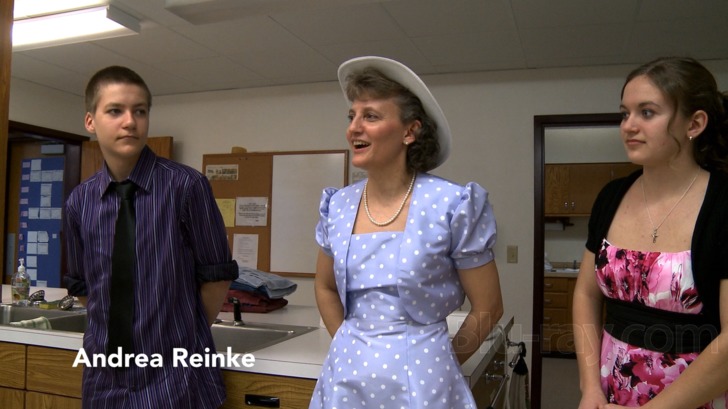
Director Moss was the one-man crew for The Overnighters, and he shot all the footage himself, with the exception of a few small inserts he obtained from a news outlet. The make of digital camera is not specified, but the results suggest professional equipment. The image on Drafthouse's 1080p, AVC-encoded Blu-ray displays excellent detail, clarity and color, consistent with a first-rate HDTV broadcast. There is no obvious noise or interference, and the only limitations of the image are those imposed by natural light. Perhaps the highest praise one can offer of this video presentation is that it provides transparency between the viewer and the subjects of Moss's documentary. Their appearance, clothing, expressions and surroundings look as real as they must have appeared when Moss was there filming them. Drafthouse has mastered The Overnighters with an average bitrate of 31.988 Mbps, which is excellent. Other studios might have been tempted to compress the film to half this rate because of the digital origination, and the result would no doubt have been adequate. At this bitrate, however, they are stellar.
The Overnighters Blu-ray Movie, Audio Quality 
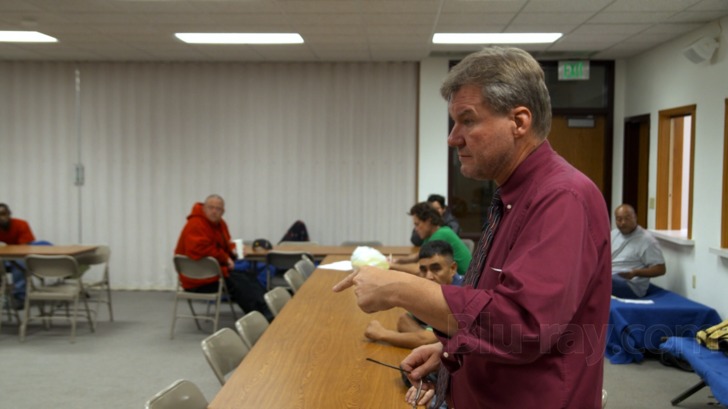
The Overnighters has a 5.1 soundtrack encoded in lossless DTS-HD MA, but like most documentaries the emphasis is on the voices in front. The 5.1 format allows breathing room for the moody but spare score by T. Griffin, a prolific composer for documentaries.
The Overnighters Blu-ray Movie, Special Features and Extras 
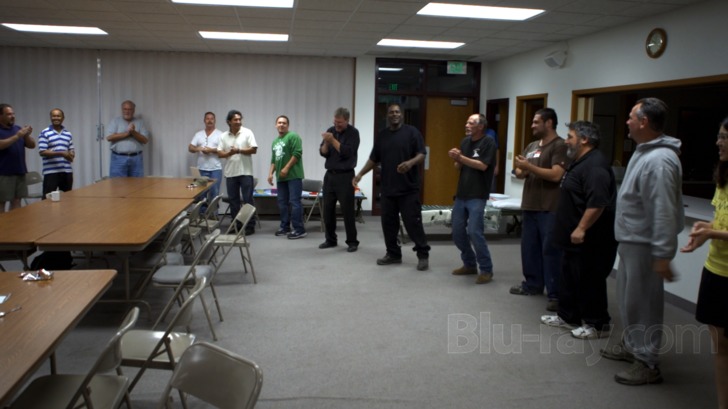
- Commentary with Director Jesse Moss and Jay Reinke: This joint commentary between the documentary's writer, director and co-producer, on the one hand, and its central figure, on the other, has the virtue of filling in important background information concerning individual scenes and people. Moss has so effectively rendered himself invisible in the finished product that it is helpful to hear about how he inserted himself into the Concordia Lutheran Church. The downside of having the two men speak together is that we don't hear enough from Moss; Reinke does much of the talking, and he already has an entire film, plus the "Interview Update" below, to tell his story. Except for the "Director's Statement" in the enclosed booklet, we never get to hear Moss's independent perspective.
- Interview Update with Jay Reinke (1080p; 1.78:1; 23:50): Interviewed six months after the concluding events of the film, Reinke reports on developments in Williston and in his own life.
- Deleted Scenes (1080p; 1.78:1; 15:19): A "play all" option is included.
- Welcome to Williston
- Jesus Didn't Have Our Neighbors Extended Scene
- I Used to Stay Here
- Our Williston Penthouse
- Williston Shower
- Trailers
- Theatrical Trailer
- 20,000 Days on Earth
- The Act of Killing
- The Dog
- Booklet: Drafthouse's booklet includes a two-page "Director's Statement" by Moss, a series of haunting portraits of some of the overnighters by photographer Drew Ludwig (with an introductory statement by Ludwig), a picture of Concordia Lutheran, plus film and disc credits.
The Overnighters Blu-ray Movie, Overall Score and Recommendation 
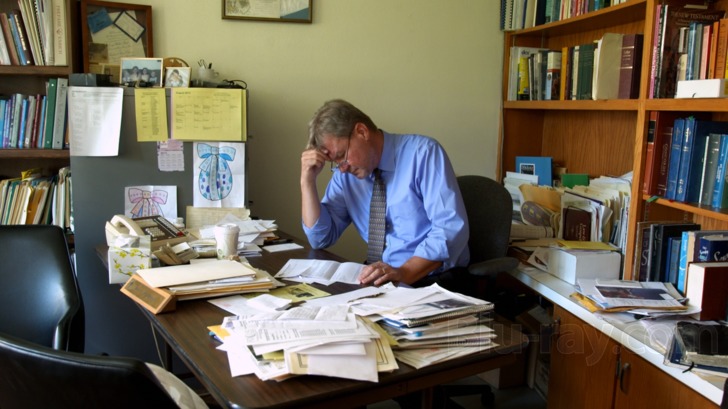
The Overnighters has been compared to John Steinbeck's The Grapes of Wrath, and it certainly echoes that landmark work in its depiction of hope and despair during a period of sweeping economic dislocation. As a sociological portrait of a time in America when one part of the economy soared, while others remained stagnant, the film is an essential document. But it also poses difficult and maybe unanswerable questions about the logistics of charity in the face of practical obstacles. Pastor Reinke's experiment was so noble in its aspirations, so apparently well-designed in its execution, and yet so ultimately disastrous in its outcome, that it could become a fertile topic for Christian study groups everywhere. Religion aside, you will not find a more compelling human drama in any recent film. Highly recommended.
Similar titles
Similar titles you might also like

First Reformed
2017

Goodbye to Language 3D
Adieu au langage
2014

Tender Mercies
1983

Loveless
Нелюбовь / Nelyubov
2017

Beyond the Hills
După dealuri
2012

Jodorowsky's Dune
2013

Cameraperson
2016

Bullhead
Rundskop
2011

Pioneer
Pionér
2013

My Old Lady
2014

Her Smell
2018

Sorry We Missed You
2019

Not Wanted
1949

We Are the Best!
Vi är bäst
2013

The Rocket
2013

Diary of a Lost Girl
Tagebuch einer Verlorenen
1929

Cemetery of Splendor
2015

The Group
1966

Lost Soul: The Doomed Journey of Richard Stanley's Island of Dr. Moreau
House of Pain Edition
2014

Le beau Serge
1958